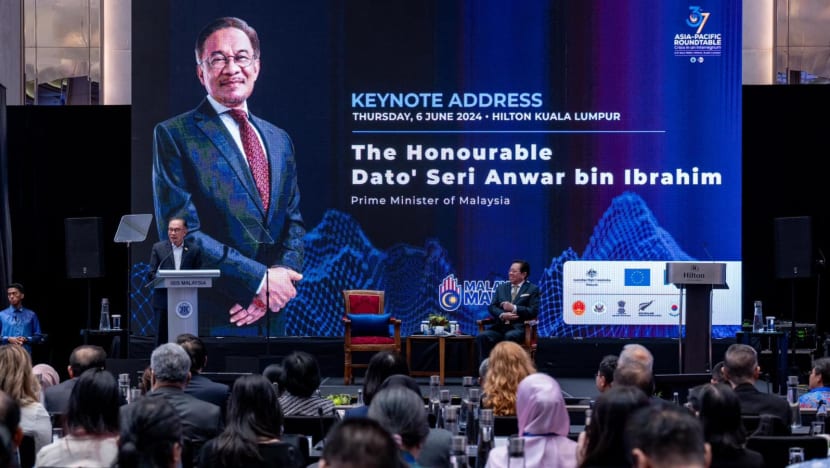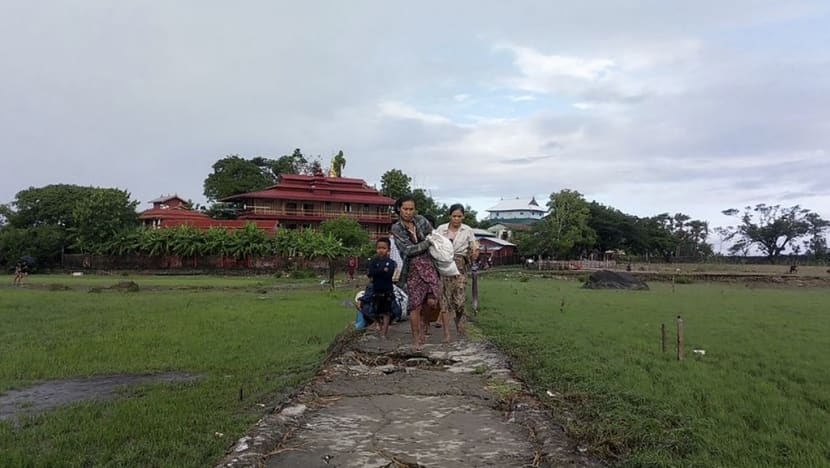Malaysia PM Anwar says ASEAN needs to move from mere rhetoric to concrete action
Malaysia Prime Minister Anwar Ibrahim has been speaking publicly in recent weeks about the country’s goals for ASEAN as it prepares to take over as the grouping’s rotating chair in 2025.

Malaysia Prime Minister Anwar Ibrahim speaking at the 37th Asia-Pacific Roundtable in Kuala Lumpur on Jun 6, 2024. (Photo: Facebook/Anwar Ibrahim)

This audio is generated by an AI tool.
KUALA LUMPUR: Several mechanisms under the Association of Southeast Asian Nations (ASEAN) are underutilised and while they had been celebrated for their convening powers, they now appear to “plod along by fact of existence”, said Malaysia Prime Minister Anwar Ibrahim.
He cited as examples the ASEAN Regional Forum, the ASEAN Plus meetings, and the East Asia Summit, which bring together the 10 ASEAN member states and other external partners like the United States, China, India, Japan and South Korea for dialogue and cooperation on various issues.
Speaking at the 37th Asia-Pacific Roundtable in Kuala Lumpur on Thursday (Jun 6), Mr Anwar pledged to tackle this issue as part of a redoubling of efforts to strengthen the regional grouping.
“In these times of great uncertainty, it is imperative to redouble our efforts towards further strengthening ASEAN, to be the key platform in managing regional affairs.
“We need to move from mere rhetoric to concrete action and focus on seeking ways to deliver on its aspirations,” he said.
ASEAN NEEDS “UNIFIED VOICE” ON MYANMAR
Mr Anwar has been speaking publicly in recent months about Malaysia’s goals for Asean as the country prepares to take over as the grouping’s rotating chair in 2025.
In May, he said he wanted ASEAN to double down on its collective economic strength as it tackles the Myanmar and South China Sea issues.
"What ASEAN needs is a more aggressive and dynamic approach to ensure that it remains to be a cohesive force," he said in an exclusive interview with Nikkei Asia and TV Tokyo on the sidelines of Nikkei's Future of Asia summit in the Japanese capital.
In a Facebook post on Thursday, Mr Anwar stressed that ASEAN member-states need to unite in facing the crisis in Myanmar, considering the death toll there and the conflict’s impact on the region.
Mr Anwar said in his speech that Malaysia would lead ASEAN with “moral character” and use a “civil and inclusive” framework that promotes interconnectivity.
“Indeed for Malaysia, ASEAN, more than a pillar of our foreign policy, is also a force multiplier, and a valuable asset to exercise our agency,” he said, adding that it should also be anchored on how ASEAN’s future development evolves alongside its member states, along with their national interests and collective goals.
Mr Anwar also gave hints that he will push for ASEAN to be tougher on its member Myanmar, where pro-democracy guerrillas and ethnic minority armed forces are battling the country’s military, which took power in 2021 after it ousted the elected government of Aung San Suu Kyi.
On May 24, the UN human rights office warned of “frightening and disturbing reports” about the impact of new violence in Myanmar’s western state of Rakhine, pointing to new attacks on Rohingya civilians by the military and an ethnic armed group fighting it.
A spokesperson for the office cited the burning of the town of Buthidaung, as well as air strikes, reports of shootings at unarmed fleeing villagers, beheadings and disappearances as part of the violence in the northern part of Rakhine in recent weeks.

Mr Anwar said the message ASEAN should cover on Myanmar should come from a “unified voice”.
“A difficult challenge we must contend with is the crisis in Myanmar, given the scale of death, displacement and fighting,” he said.
“Failure to act, when there is ample cause to believe that a member state is violating the spirit of the ASEAN Charter, is a dereliction of our moral duty.”
Myanmar military leader Min Aung Hlaing and his junta have been barred from ASEAN and related meetings several times.
Myanmar’s junta has also been accused of not facilitating a broad list of priorities, called the Five-Point Consensus, it initially agreed with in 2021 that would allow ASEAN to help tackle the crisis. Analysts have said the complex issue will take years to resolve.
While Mr Anwar acknowledged it is not ASEAN’s place to decide what is best for the Myanmar people, he said it is incumbent on friends and neighbours to help where they can.
“Of course, ASEAN can only facilitate any efforts when the various parties in Myanmar are ready to do so,” he said.
“But this does not mean that we should not try multipronged, more creative tracks. The status quo is not static.”
Mr Anwar said Malaysia will work with other ASEAN member states, as well as dialogue partners with influence over Myanmar, to push for peace, more effective humanitarian mechanisms and the eventual political engagement of all relevant stakeholders in the country.
MALAYSIA NOT “TILTING TO ONE SIDE” AMID US-CHINA TENSIONS
The Myanmar situation is among issues on which ASEAN has been criticised for not taking firmer, faster action. Another example involves the territorial disputes in the South China Sea, which China claims as its own amid competing claims by several ASEAN member states.
In his speech, Mr Anwar also said armed conflicts and geopolitical tensions on a broader scale have overshadowed some regional mechanisms and multilateral frameworks.
“This is a system which was designed in the post-war era to ensure peace and stability, one that held much promise in the rhetoric but proven to be a dismal failure in the delivery,” he said.
Mr Anwar dismissed suggestions that Malaysia was “tilting to one side” amid US-China tensions, as his country has consistently voiced concerns about the reluctance of the US and the West to apply pressure on Israel in its war in Gaza.
“This is not only an oversimplification but a gross misperception of our national interests and character,” he said, adding that Malaysia is fiercely independent and will continue to strive for its national and strategic interests.
The Malaysian prime minister also reiterated calls for a comprehensive reform and expansion of the United Nations Security Council (UNSC) to ensure equitable regional representation and reflect “current realities”.
The five permanent members of the UNSC - China, France, Russia, the United Kingdom, and the United States of America - are all from what has been termed as the Global North, in contrast to the Global South, which generally represents developing countries in Asia, Africa, and Latin America.
The distinction traditionally groups countries based on their defining characteristics with regard to socioeconomics and politics.
For instance, most Global South countries are commonly identified as lacking in their standard of living, which includes having lower incomes and high levels of poverty.
Mr Anwar said on Thursday that divergences between the Global North and Global South are no longer about development, but distinctly ideological, experiential and perceptual factors.
“In the battle for inclusion, it represents the reclaiming of a voice not to be ignored in the international order. We see a reflection of this in the urgent call for restructuring the United Nations.”
WHAT MALAYSIA COULD DO WITH ASEAN
Associate Professor Chong Ja Ian, who researches international relations at the National University of Singapore, said many of ASEAN’s mechanisms were developed between the 1990s and early 2000s in anticipation of the bloc playing a larger role in promoting regional stability, including in confidence building and preventive diplomacy.
“Their use has been very limited so far, with a focus on ASEAN convening meetings rather than taking greater initiative,” he told CNA.
For instance, the ASEAN Regional Forum currently comprises 27 participants, including ASEAN member states as well as the US, China, Russia, the European Union, South Korea and North Korea.
The forum, started in 1994, aimed to be an effective and consultative Asia-Pacific platform for promoting open dialogue on political and security cooperation in the region.
Assoc Prof Chong said Mr Anwar could spend political capital to ensure Malaysia reforms the bloc to “live up to its promise” under its existing mandate, but cautioned that this would take more than the ASEAN chair alone.
“It requires consensus among all ASEAN members to commit to reform over a period of time. Given existing divisions within ASEAN in terms of priorities and interests, I am unsure if member states are currently ready for such an endeavour,” he said.
On Myanmar, he said Malaysia as ASEAN chair could engage with the various parties in Myanmar as a bloc to push for forward movement on negotiations.
“This will mean putting pressure on actors that are recalcitrant, including possibly the Myanmar military,” he said, noting that working with other interested actors like Bangladesh, India, China and the US could also help.
“Again, it would take significant effort to get ASEAN member states on the same page to commit political capital to what looks to be an extended process. Such efforts are likely to extend beyond the term of one or even two chairs.”
















